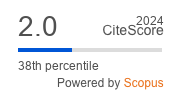The Reliability and Validity of the Three Modified Versions of the Children’s Fear Survey Schedule-Dental Subscale of 9-12 Year Old Children in a Clinical Setting in Bosnia and Herzegovina
DOI:
https://doi.org/10.5644/ama2006-124.209Keywords:
Dental fear and anxiety, Children, CFSS-DS scale, Modified versions, Reliability and validityAbstract
Objectives. This study sought to obtain a comprehensive, reliable and valid instrument for evaluation of the presence of dental fear and anxiety (DFA) in children, through evaluation of the reliability and validity of three modified versions of the Children’s Fear Survey Schedule-Dental Subscale (CFSS-DS).
Materials and Methods. The study sample comprised children aged 9, 10, 11 and 12 years. The first sample group (200 patients) filled in a modified version of the CFSSDS scale, the second sample group (100 patients) filled in a short form of the Dental Fear Survey Schedule, and the third sample group (100 patients) filled in a short version of the CFSS-DS scale, prior to dental
treatment, respectively. In order to determine test-retest reliability, the 184 patients from the first sample group filled in the modified version of the CFSS-DS scale again, prior to their next scheduled dental appointment.
Results. The modified version of the CFSS-DS scale had the best internal consistency reliability (α=0.907), as well as validity results, compared to the other two instruments used. Test-retest reliability was moderate (Intraclass correlation coefficient: 0.58).
Conclusions. Of the three psychometric instruments used for evaluation of DFA presence in children, the modified version of the CFSS-DS scale showed the most clinically adequate reliability and validity values. This study thus provides a new psychometric instrument that should be considered for clinical use in evaluation of DFA presence in 9-12 year-olds, in a clinical setting sample type of children.





